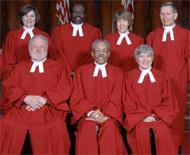6/7/2012
Maryland: Top Judges Consider Speed Camera LegalityThe highest court in Maryland hears oral arguments on whether cities are violating that law with their speed camera programs.

Maryland's highest court, the Court of Appeals, yesterday heard oral arguments in a challenge to the way speed cameras are used in the state. At issue is whether municipalities are directly violating a state law that prohibits private contractors that operate photo radar programs from being paid on a per-ticket basis. Cities and counties believe they can evade the law by revising their contracts to say that the companies that run all aspects of ticketing do not "operate" the speed camera program.
In October, the Court of Special Appeals sidestepped the question, ruling against the challengers on the procedural ground that they failed to bring their case first before a district court (view opinion). The three-judge panel did observe that there was "no reason" to look beyond the language of the contract to see if state law applies.
"If a contractor operates a speed monitoring system on behalf of Montgomery County, the contractor's fee may not be contingent on the number of citations issued or paid," state code section 21-809 states.
A group of motorists had filed a class action lawsuit in 2008 against Montgomery County, the cities of Rockville and Gaithersburg, and Chevy Chase Village because each paid Affiliated Computer Services (ACS) $16.25 for each ticket the company issued. In 2009, each of those jurisdictions changed their contracts to state that the contractor does not operate the photo enforcement program. Kevin Karpinski, the attorney representing Chevy Chase and Gaithersburg, admitted under questioning from the state's highest court Wednesday that this was only a change on paper.
"Have there been substantial changes to the issue?" Karpinski said. "No, there have not been."
Timothy Leahy, the attorney representing ticketed drivers, insisted the General Assembly specifically meant to ban per-ticket contracts in every case. He argued that merely coming up with a new label in a written contract document does not absolve them from compliance with the law.
"They didn't change their daily functions," Timothy Leahy said. "The parties simply said, 'I'm going to do a square dance but call it a waltz.' They're still doing a square dance."
From the bench, Judge Lynne A. Battaglia expressed concern about the contingent fee contract structure.
"The concept of having a bounty creates an entrepreneurial interest, such that ACS or whomever gets the bounty has an interest in the operation that it would not have were there no bounty system," Battaglia said. "If they do their job and put up the poles, they're done. But once you say we're giving you money for each citation, there's a skewing of that relationship such that they are concerned about the operation... It is the capital concern that I have right here.... In saying this, I have not had one of these (tickets). I'm certainly going to stay out of Gaithersburg and the other areas."


